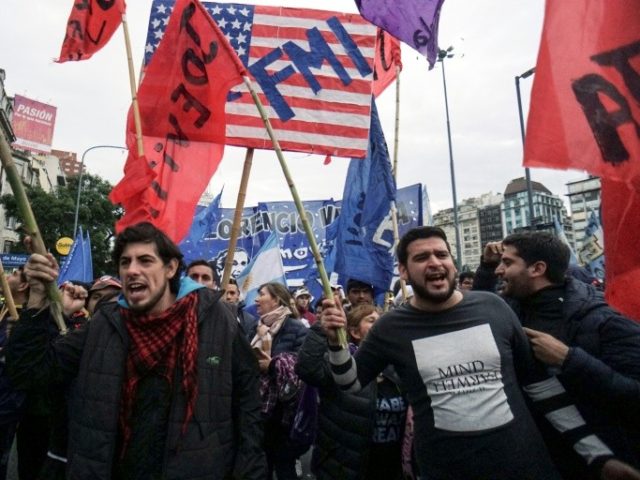This morning’s key headlines from GenerationalDynamics.com
- Argentina faces major financial crisis as IMF loans it $50 billion
- Protests grow against new IMF deal in Argentina
Argentina faces major financial crisis as IMF loans it $50 billion
![Protester holds up sign saying '[President] Macri + IMF = Poverty' (AFP)](https://Media.GenerationalDynamics.com/ww2010/g180608b.jpg)
Protester holds up sign saying ‘[President] Macri + IMF = Poverty’ (AFP)
International Monetary Fund (IMF) has agreed to lend Argentina’s government up to $50 billion over a three year period to help the country stanch a monetary crisis that could end in default. President Mauricio Macri felt he was forced to get help from the IMF, even though most Argentinian people are bitterly angry at the IMF for pulling the plug on a previous bailout. Anti-IMF protests have already begun, demanding that Macri back out of the agreement.
The current crisis was triggered earlier this year, when an interest rate increase by the American Federal Reserve caused the yield (interest rate) on American 10-year Treasury bonds to rise to 3 percent for the first time since January 2014. This action by the American central bank had a domino effect on the currencies of other countries. Investors that had purchased bonds issued by other countries suddenly had the choice of purchasing American 10-year bonds, normally considered one of the least risky investments in the world, at a higher interest rate than before.
The currencies of so-called “emerging market” countries were the hardest hit, including Turkey, Russia, Brazil, and Mexico. But Argentina, with an inflation rate of 21 percent and a rapidly growing pile of foreign-currency debt, was hit especially hard, with the result that the peso lost 20 percent of its value against the dollar.
Argentina’s economy had been improving since president Mauricio Macri took office in 2015. But in retrospect, Macri made some serious errors by going too deeply into debt denominated in dollars. When the Fed raised its interest rates to 3 percent, it raised the interest due on the money that Argentina had borrowed, and now the country is so far into debt that it cannot repay and facing the possible disaster of a default. BBC and International Monetary Fund (IMF) and Bloomberg and Guardian (London)
Protests grow against new IMF deal in Argentina
The people of Argentina do not loathe the IMF because the IMF is lending them $50 billion. The people of Argentina loathe the IMF because the IMF imposes austerity commitment whenever it loans money, and the mention of austerity brings back bitter memories.
In the 1990s, Argentina’s peso was pegged to the dollar. In 1998, the country faced a financial crisis but was unable to devalue the currency without abandoning its peg to the dollar. In 2000, the IMF loaned Argentina billions of dollars, and imposed austerity requirements. When Argentina failed to meet its commitment, the IMF pulled the plug, sending Argentina into a $100 billion default.
The default was a major crisis for Argentina, which most people there blame on the IMF. However, the economy began to stabilize under President Néstor Kirchner, who governed from 2003 to 2007. When Kirchner declined to run for another term, his wife Cristina Fernández de Kirchner ran for president and won. The radical far left Cristina was president from 2007-2015 and undid all the good that her husband had accomplished by raising public spending, nationalizing companies, and heavily subsidizing everything from utilities to football transmissions on television. (Cristina, by the way, in December 2017 was arrested for allegedly covering up Iranian involvement in a 1994 bombing that killed 85 people at a Jewish community center, in order to get favorable terms on Iranian oil).
President Mauricio Macri is considered to have been fiscally responsible since taking office in 2015, especially after years of unbridled spending. However, he had no choice but to go to the IMF for help, which many Argentinians consider to be loathsome, and that may doom him in next year’s elections. Buenos Aires Times and Economist and al-Jazeera (7-Dec-2017) and BBC (15-May)
Related Articles:
- Pope Francis may side with Argentina in Falklands dispute with Britain (15-Mar-2013)
- Venezuela’s Chávez says U.S. is giving cancer to Latin leaders (15-Jan-2012)
- Works by Iannis Xenakis gain wider prominence and recognition (12-Sep-2010)
KEYS: Generational Dynamics, Argentina, International Monetary Fund, IMF, Mauricio Macri, Néstor Kirchner, Cristina Fernández de Kirchner, Turkey, Russia, Brazil, Mexico
Permanent web link to this article
Receive daily World View columns by e-mail

COMMENTS
Please let us know if you're having issues with commenting.